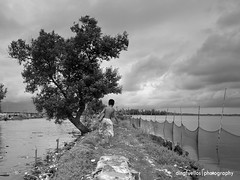I HAD A chance to sneak-in during the Luzon Inter-PAC Development Planning Workshop of the PEACE and Equity Foundation (PEF) yesterday, and had a rare opportunity to listen to the lecture of Dan Songco where he discussed the need for NGOs to engage into social enterprises. The following is a summary of what I learned from him:
"During the 80s, NGOs responded to the needs of the time to help the government deliver the service gaps the latter has failed to deliver. During this time, funding from the international donor agencies were abundant. However, in the 90s, grants for programs and projects began to come in trickles. As a result, some NGOs, which failed to sustain their operations because of heavy dependence on external funding sources, either closed shop or have limited their areas of operations and scope of services. NGOs now face a financial sustainability issue.
One possible solution to this is for NGOs to venture into social enterprises. The bottomline is earning profit in order for them to pursue their mission and goal for the clients they intend to serve. Now, they have to rethink their strategies, identify their strength, study the market and learn what they were not used to do--that is making profit."
This is not impossible. Some are already into social enterprises. One common example is the Good Shepherd Convent in Baguio City. With limited funding for their scholarship project, they used their craft and skill in cooking jams and sweets, thus Good Shepherd in Baguio is somewhat synonymous to jams and jellies. With their profit, they could send girls to school.
I also had a chance to work with the Salesian Brothers of St. Louis School of Dumaguete (which was formerly operated by the CICM congregation, thus the name St. Louis). The Salesian Brothers are running the Don Bosco, which is known for their technical and vocational school for the poor. Since Dumaguete City is still primarily agricultural, they rather engaged into Diversified and Integrated Farming Training Program. Initially, they got funding from the German Doctors for Developing Countries and Algers Foundation. However, they failed to sustain their operations after the funding has been exhausted. Learning from this, they proposed to the Philippines-Canada Development Fund (where I used to work as a Project Officer) that they would like to sustain their project. Thus, the program includes income-generating component (setting up their piggery and poultry projects), which aims to raise funds for financial sustainability, as well as to continue the mission to train poor households on their farming technology. And it didn't hurt the intended beneficiaries now if they were charged for a minimal fee for their training. Now, the DIFTP is self-sustaining. The last time I heard, they have expanded their services into the other barangays.
If NGOs' mission then was guided by the motto "teach a man how to fish" in order for him to be free from the bondage of poverty, today's NGOs must also learn how to fend for themselves, and become financially independent in order that they can stay on the ground and sustain their mission.
Note: Dan Songco, together with Karen Tañada, was also one of my mentors in Community Organizing for Coastal Resource Management way back ca. 1992.
skip to main |
skip to sidebar
blogging about anything and everything, under the Orient sun
Translate this blog
Lifeline
|
|
|
Inked on:
April 29, 2007
|
Heart and soul
Read other popular posts
- At home [and at peace] with HDR Photography
- Full, free and unconditional pardon
- When "It's more fun in the Philippines!" clicks, and when it doesn't
- The problem with call centers
- Countdown to Christmas
- TAXIKICK: Will it click?
- Love month. Love hunt.
- Between two passions
- How Baguio wants to be remembered
- Celebrating Life, instead!
Labels
Adel Tamano
Arts and Crafts
Baguio City
Batanes
Blogging and Technology
Bontoc
Breast Cancer Awareness
Celebrities
Christmas 2009 Countdown
Climate change
CNN Hero of the Year
CNN Heroes
Contests
Cordillera
Cory Aquino
Dapitan City
Department of Tourism
Desaparecidos
Development Concerns
Dining
DOT
Earth Day
Earth Hour
EDSA
Education
Efren Peñaflorida
Egosurfing
Election 2010
Entertainment and the Arts
Environment
Event
Facebook
festivals
Filipino Culture and Tradition
Flickr
Food
Google Plu
Google search
HDR
Health
Hello Garci Scandal
Heroism
High Dynamic Range
History
Humor
It is more fun in the Philippines
Jonas Burgos
Joseph Estrada
Life of a bum
Manila
Manny Pacquiao
Mindanao
Movies
Music
Ninoy Aquino
Outreach
Party List
Peace process
People Power Revolution
Personal reflections
Philippine travel blog
Photograph
Photography
Poverty and Poverty Alleviation
Presidentiable
Psychology
Public Policy and Governance
Rants
Senatoriables
The Pinoy Explorer
Travel
travel blog
Vice Presidentiable
Videos
Water
WOW Pilipinas
Yahoo Search
Blog Archive
-
▼
2007
(80)
-
▼
May
(13)
- Adel Tamano on the defense
- Maguindanao 12-0 vote, explained
- NGOs must learn how to fish
- Among Governor
- The legacy of an old chair
- In the defense of birthright
- Jungianisms
- FREE JONAS BURGOS
- Understanding and embracing blogging
- Igorot Foot Massage
- Weaving the tapestry for saving the Cordillera wea...
- Baguio vignettes
- Of Maryhurst, flowers and drizzles
-
▼
May
(13)
Copyright © 2007-2011 by INKBLOTS: Life as it happens | Powered by Blogger
Design by Free WordPress Themes | Bloggerized by Lasantha - Premium Blogger Themes | Best Hostgator Coupon Code















0 people have commented. Leave your comments too!:
Post a Comment
Thank you for visiting and reading my blog! If you want to say something about this blog entry, please leave your comments below.
Please be informed that the author prevents spamming, thus the moderated comments. Nonetheless, your comments will be published after the author has reviewed them.
Bear in mind that your contact information will be kept confidential.
If you wish to send me private message, please follow this link:
http://ding-inkblots.blogspot.com/p/contact.html
Salamat! (Thank you!)